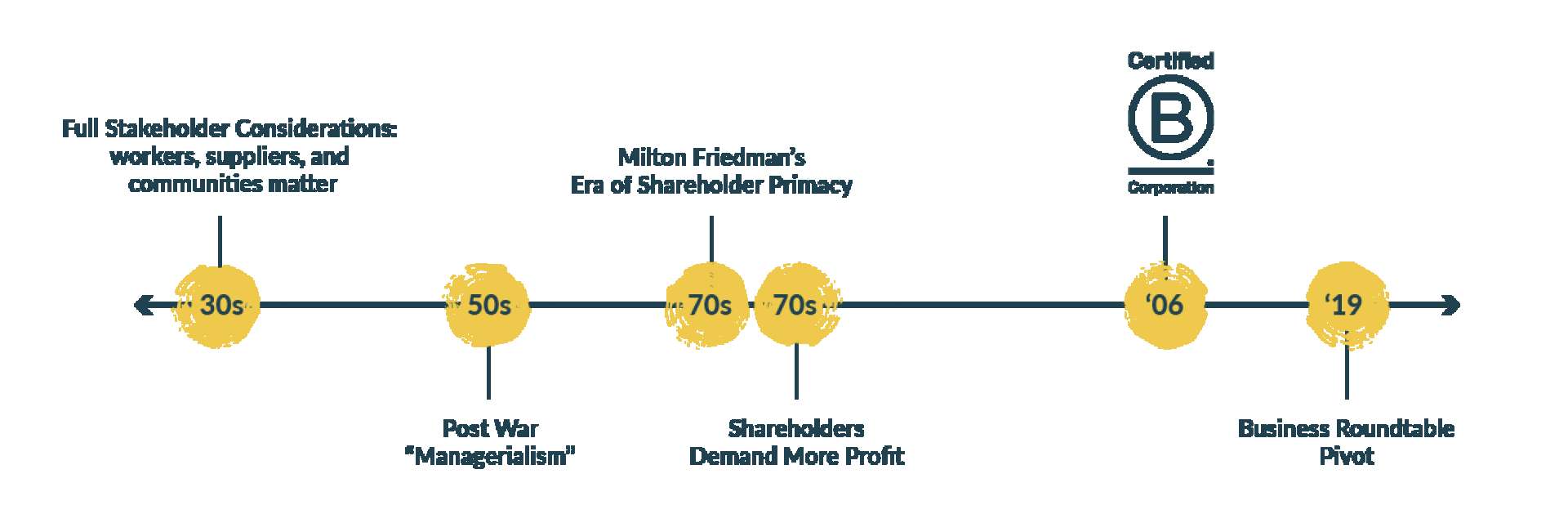Build a Better Business - Governance
The first dimension in the B Corp framework is Governance. Most businesses have some sort of governance mechanism and in that sense, the underlying concept isn’t new. What is new: with an increased focus on sustainability governance becomes an important mechanism for ensuring that your values and mission are tightly integrated into everything your business does. Governance provides direction for employees, increases transparency into your business practices to make it easier for you to demonstrate your values, and helps ensure the values you establish will survive into the future.

One aspect of governance is defining why your business exists. Beginning in the 1970s, Milton Friedman was influential in defining the purpose of business as serving shareholders only – a concept often referred to as shareholder primacy. Prior to the 1970s, business was viewed as an integral part of community building and the notion of shareholder primacy introduced an extended period of business as an engine for shareholder profit with general disregard for everything else. In 2006, B Lab (the non-profit driving the B Corp movement) created the concept of B Corp to reclaim the role of business as an integral part of community building and sustainability. And over a decade later, the Business Roundtable agreed to shift away from shareholder primacy and embrace a more holistic role for business in the world.
With this shift, businesses need to think about their practices relative to Workers, Community, Environment, and Customers. And to ensure that practices across these four stakeholder groups are appropriately considered and effectively executed – for the benefit of those stakeholder groups – within the business operations, Governance becomes an increasingly important discipline.
The following are a few examples of how B Corps use Governance in their business:
- integrate a commitment to social and/or environmental responsibility into their written corporate mission statement
- evaluate employees and management on their performance with regard to their company’s social and environmental targets
- tie social and environmental performance to bonuses or other rewards
- include non-executive employees, community members, and environmental experts on their board of directors
- share basic financial information with their employees to improve transparency and create awareness about how their actions impact bottom-line performance
Maybe this seems like a lot of extra work. And perhaps a tad bit (or quite) overwhelming. The reality is that even in an environment of shareholder primacy, effective governance means that company performance goals are tightly integrated into individual performance so that every employee understands how their work impacts overall business objectives, that the strategic direction is clearly communicated throughout the organization so that every employee knows where they and the business are going, and that information is shared widely so that employees can quickly and effectively solve the right problems.
In that way, Governance isn’t something new and different. Governance is the mechanism that creates and drives a culture, a mechanism that preserves your values into the future, and a mechanism that optimizes the overall performance of your business. Whether or not you focus on sustainability or certify as a B Corp, effective governance is critical to the overall health of your business and it is important to get it right. And in a changing environment where customers and employees are demanding a higher purpose for business, it is time to ensure your governance practices position you to meet those demands.
Next week we will talk about Workers, providing some insight into how B Corps think about them within their businesses.
Overwhelmed? We’ve got this! For the good.
For more information:
NY Times podcast on the history of governance
Read More
Reject the business case for sustainability: The 1980s wants its business case back
They say a rising tide raises all boats. But there isn’t any raising to be done when the tide no longer comes into the bay – all boats remain stranded. We are often asked about the business case for sustainability. For y
Protect Your Community or Organization with a Climate Action Plan
Introduction Our changing climate impacts every aspect of our lives—our economy, our communities, and the environment—in ways both visible and unseen. While scientists and environmental organizations have long recognized
Witnessing the world of sustainable business firsthand
As a young student with a passion for climate justice and sustainability, it always felt like a contradiction to pursue a degree in business. From what I had witnessed, businesses didn’t necessarily operate ethically. Mu
Interning with Purpose: My Journey with Measure Meant
From January to May 2024, I had the distinct pleasure of working with Measure Meant as an Operations Intern. As a graduating senior at Gonzaga University, I had not planned on pursuing another internship in my final seme




